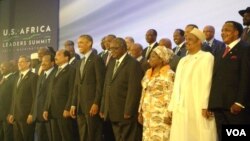The African Union (AU) Commission says it is satisfied by the outcome of the just-ended historic U.S-Africa Leaders Summit that was called by President Barack Obama in Washington.
“We hope that the implementation of the agreed positions would take place just as expeditiously as the summit did because any summit is as good as its follow-up, as good as the implementation,” said AU Commission chairperson, Dr. Nkosazana Dlamini-Zuma.
Speaking at a press conference following the end of the Summit, Dlamini-Zuma said Africa’s priority areas had largely been discussed in a cordial atmosphere.
“It was a very successful summit with frank discussions among the leaders,” she said.
“We commend President Obama’s leadership and commitment as well as of his administration to the deepening of U.S.-Africa partnership," she said, adding the summit was an important milestone in the longstanding relationship between U.S. and Africa.
Discussions
For three days heads of state and government, civil society and private sector leaders engaged in discussions on taking the partnership to a new level based on mutual respect and shared interests.
Dlamini-Zuma said Africa was looking for partnerships in areas including strengthening the continent’s youthful human resource base, infrastructure, health and energy, among others.
“Africa looks forward to doing business with American companies, not because we need aid or assistance, but because it makes business sense to invest in Africa,” she said.
“If American businesses do not hasten to invest, others will, because it makes sense to do so.”
Support
President Barack Obama announced at the end of the Summit that the United States will invest $110 million per year for three to five years to help build the capacity of African militaries to rapidly deploy peacekeepers to a variety of threats, including conflicts, terrorist activity and human trafficking.
The African Peacekeeping Rapid Response Partnership, Dlamini-Zuma told the media, is critical in maintaining peace and stability on the continent.
The partnership will begin with six African nations - Senegal, Ghana, Ethiopia, Rwanda, Tanzania, and Uganda.
They will commit to maintain forces and equipment to rapidly deploy, and will agree to deploy with United Nations and African Union missions in Africa.
Disease Control
Another major outcome is the agreement between Africa and the U.S. to establish a center for disease control in Africa to help fight diseases on the continent.
“The African Union had already taken that decision that we establish a center for disease control but the U.S. is going to come in because they have experience on that issue with the Centres for Disease Control in Atlanta, so they will be coming to work with us,” said Dlamini-Zuma.
The AUC chairperson said the summit was held at an opportune time, when Africa is conceiving its Agenda 2063, the future it wants in the next 50 years.
The content of the high level dialogue was in line with the Common African Position on Post-2015 Development agenda, and the aspirations of the African people, clearly emerging from consultations, she revealed.
Priorities
The leaders examined how to work together to advance trade and investment relations, particularly in infrastructure and energy, transforming African economies and integrating the global value chains.
The importance of quality and timely service delivery was emphasized.
Regional integration, it was agreed, must be accelerated not just as a social imperative, but as an economic necessity.
President Obama pledged to support Africa’s integration initiatives, while contributing to building capacity to facilitate intra-continental trade, as well as negotiating fair contractual agreements with investors, to enhance beneficiation from local resource exploitation.
During the dialogue with the almost 50 African leaders in attendance, they also agreed on the need to curb illicit financial flows from Africa, which Dlamini-Zuma says are bleeding the continent.
"The illicit financial flows are actually more than what we get in aid," she said.
Mechanisms will be established to build the capacities of African States to monitor and limit the illicit flow of funds through tax evasion and other unacceptable methods.
Women and Youth
The leaders also agreed on the need to invest more in women and youth.
Supporting the empowerment of youth and women will remain central as the leaders look toward investing in the next generation as was the main theme of the Summit, said Dlamini-Zuma.
Ahead of the conference about 500 African youths had been invited to participate in the Mandela Washington Fellowship for Young African Leadership Initiative in the United States.
President Barack Obama said he would encourage his successor to continue with his initiative, which he described as a “critical part of our work going forward.”




